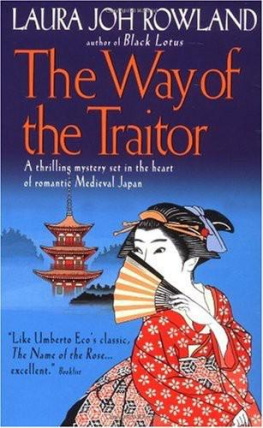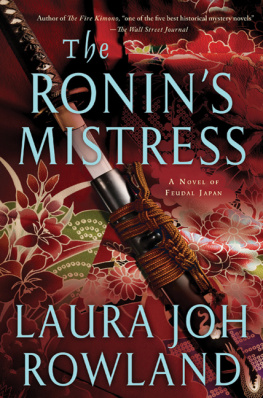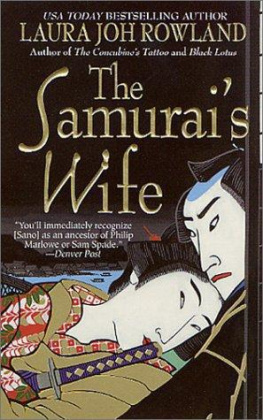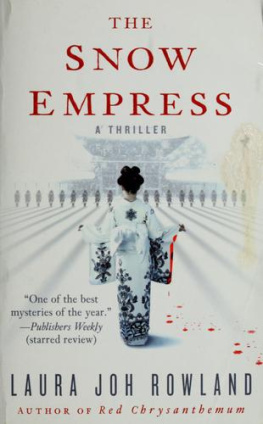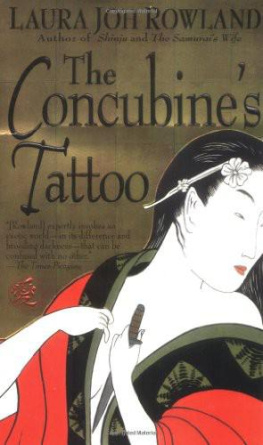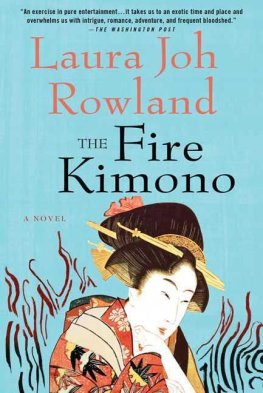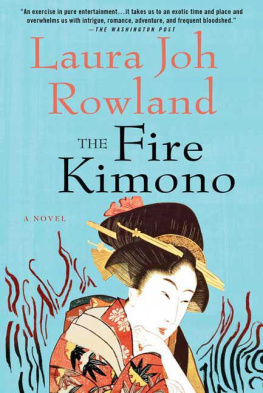Laura Joh Rowland - The Dragon Kings Palace
Here you can read online Laura Joh Rowland - The Dragon Kings Palace full text of the book (entire story) in english for free. Download pdf and epub, get meaning, cover and reviews about this ebook. year: 2003, publisher: Minotaur Books, genre: Romance novel. Description of the work, (preface) as well as reviews are available. Best literature library LitArk.com created for fans of good reading and offers a wide selection of genres:
Romance novel
Science fiction
Adventure
Detective
Science
History
Home and family
Prose
Art
Politics
Computer
Non-fiction
Religion
Business
Children
Humor
Choose a favorite category and find really read worthwhile books. Enjoy immersion in the world of imagination, feel the emotions of the characters or learn something new for yourself, make an fascinating discovery.
- Book:The Dragon Kings Palace
- Author:
- Publisher:Minotaur Books
- Genre:
- Year:2003
- Rating:4 / 5
- Favourites:Add to favourites
- Your mark:
- 80
- 1
- 2
- 3
- 4
- 5
The Dragon Kings Palace: summary, description and annotation
We offer to read an annotation, description, summary or preface (depends on what the author of the book "The Dragon Kings Palace" wrote himself). If you haven't found the necessary information about the book — write in the comments, we will try to find it.
The Dragon Kings Palace — read online for free the complete book (whole text) full work
Below is the text of the book, divided by pages. System saving the place of the last page read, allows you to conveniently read the book "The Dragon Kings Palace" online for free, without having to search again every time where you left off. Put a bookmark, and you can go to the page where you finished reading at any time.
Font size:
Interval:
Bookmark:
Laura Joh Rowland - Sano Ichiro 08 - Dragon King's Palace
Prologue
Japan, Tenwa Period, Year 2, Month 5 (June 1682)
Across dark water skimmed the boat, bound on a journey toward misadventure. Poles attached to the narrow, open wooden shell supported a red silk canopy; a round white lantern glowed from a hook above the stern. Beneath the canopy a samurai sat, plying the oars. He wore cotton summer robes, his two swords at his waist. Though his topknot was gray and his face lined with age, his muscular body and deft movements retained the vigor of youth. Opposite him, on pillows that cushioned the bottom of the boat, a woman reclined, trailing her fingers in the water. The lantern illuminated her flowing black hair and skin radiantly white and limpid as moonbeams. An aqua kimono patterned with pastel anemones adorned her slim figure. Her lovely face wore a dreamy, contented expression.
"The night is so beautiful," she murmured.
Lake Biwa, situated northwest of the imperial capital of Miyako, spread around them, still and shimmering as a vast black mirror. On the near shore, lights from the inns and docks of port villages formed a glittering crescent; darkness and distance obscured the farther boundaries of the lake. Many other pleasure boats dotted the water, their lanterns flickering. Fireworks exploded into rosettes of green, red, and white sparks that flared against the indigo sky and reflected in the water. Cries of admiration arose from people aboard the boats. A gentle breeze cooled the sultry summer eve and carried the scent of gunpowder. But the samurai gleaned no enjoyment from the scene. A terrible anguish tortured him as he beheld his wife.
"You are even more beautiful than the night," he said.
All during their marriage he'd taken for granted that her beauty belonged only to him, and that he alone possessed her love, despite the twenty years' difference in their ages. But recently he'd learned otherwise. Betrayal had shattered his illusions. Now, as his wife smiled him, he could almost see the shadow of another man darkening and fouling the air between them. Rage enflamed the samurai.
"What a strange look is on your face," said his wife. "Is something wrong?"
"Quite the contrary." Tonight he would redress the evil done to him. He rowed harder, away from the other boats, away from the lights on shore.
His wife stirred and her expression turned uneasy. "Dearest, we're getting too far from land," she said, removing her hand from the water that streamed past the boat. "Shouldn't we go back?"
The samurai stilled the oars. The boat drifted in the vast darkness beyond the colorful bursts of the rockets. The explosions echoed across the water, but the cries were fainter and the lights mere pinpoints. Stars glittered like cold jewels around a filigree gold moon. "We aren't going back," he said.
Sitting upright, his wife gazed at him in confusion. He spoke quietly: "I know."
"What are you talking about?" But the sudden fear in her eyes said she understood exactly what he meant.
"I know about you and him," the samurai said, his voice harsh with grief as well as anger.
"There's nothing between us. It isn't what you think!" Breathless with her need to convince, his wife said, "I only talk to him because he's your friend."
But the man had been more than a friend to the samurai. How the double betrayal had injured his pride! Yet the worst of his anger focused on his wife, the irresistible temptress.
"You were doing more than just talking in the summer house, when you thought I was asleep," the samurai said.
She put a hand to her throat. "How-how did you find out?"
"You let him touch you and possess you," the samurai said, ignoring his wife's question. "You loved him the way you once loved me."
Always fearful of his temper, she cowered. Panic glazed her eyes, which darted as she sought a way to excuse herself. "It was only once," she faltered. "He took advantage of me. I made a mistake. He meant nothing to me." But her lies sounded shrill, desperate. Now she extended a hand to her husband. "It's you I love. I beg your forgiveness."
Her posture turned seductive; her lips curved in an enticing smile. That she thought she could pacify him so easily turned the samurai's anger to white-hot fury.
"You'll pay for betraying me!" he shouted. He lunged toward his wife and scooped her up in his arms. As she emitted a sound of bewildered surprise, he flung her overboard.
She fell sideways into the lake with a splash that drenched the boat. Her long hair and pale garments billowed around her, and she flailed her arms in a frantic attempt to keep from sinking in the deep, black water. "Please!" she cried, sobbing in terror. "I'm sorry! I repent! Save me!"
A lust for revenge prevailed over the love that the samurai still felt for his wife. He ignored her and took up the oars. She grabbed the railings of the boat, and he beat her hands with the wooden paddles until she yelped in pain and let go. He rowed away from her.
"Help!" she screamed. "I'm drowning. Help!"
Rockets boomed, louder than her cries and splashes; no one came to her rescue. While the samurai rowed farther out on the lake, he watched his wife grow smaller and her struggles weaken, heard her gasps fade. She was a water lily cut loose and dying on a pond. She deserved her misfortune. Triumph exhilarated the samurai. His wife's head sank below the surface, and diminishing ripples radiated toward the circle of light cast by his boat's lantern. Then there was silence.
The samurai let the oars rest. As the boat slowed to a stop, his triumph waned. Grief and guilt stabbed his heart. His beloved wife was gone forever, dead by his own actions. A friendship he'd cherished must end. Sobs welled from the void of despair that burgeoned within the samurai. He didn't fear punishment, because his wife's death would seem an accident, and even if anyone guessed otherwise, the law would excuse an important man of the ruling warrior class. But remorse and honor demanded atonement. And to live was unbearable.
With trembling hands, the samurai drew his short sword. Its steel blade gleamed in the lantern light and reflected his tormented face. He gathered his courage, whispered a prayer, and shut his eyes tight. Then he slashed the sword downward across his throat.
A final explosion of fireworks painted the sky with giant, sparkling colored flowers and wisps of smoke. The flotilla of pleasure craft moved toward shore, and a hush settled over Lake Biwa. The samurai's tiny lone boat drifted in the glow of its lantern until the flame burned out, then vanished into the night.
Edo, Genroku Period, Year 7, Month 5 (Tokyo, June 1694)
The great metropolis of Edo sweltered in summer. An aquamarine sky reflected in canals swollen from rains that deluged the city almost daily. The multicolored sails of pleasure craft billowed amid the ferries and barges on the Sumida River: Along the boulevards, and in temple gardens, children flew kites shaped like birds. In the Nihonbashi merchant district, the open windows, doors, and skylights of houses and shops welcomed elusive breezes; perspiring townspeople thronged marketplaces bountiful with produce. A miasma of fever rose from alleys that reeked of sewage; pungent incense smoke combated buzzing mosquitoes. Roads leading out of town were crowded with religious pilgrims marching toward distant shrines and rich folk bound for summer villas in the cooler climate of the hills. The sun blazed down upon the peaked tile roofs of Edo Castle, but trees shaded the private quarters of Lady Keisho-in, mother of the shogun Tokugawa Tsunayoshi, Japan's supreme military dictator. There, on a veranda, three ladies gathered.
"I wonder why Lady Keisho-in summoned us," said Reiko, wife of the shogun's sosakan-sama-Most Honorable Investigator of Events, Situations, and People. She looked over the railing and watched her little son, Masahiro, play in the garden. He ran laughing over grasses verdant from the rains, around a pond covered by green scum, past flowerbeds and shrubs lush with blossoms.
Font size:
Interval:
Bookmark:
Similar books «The Dragon Kings Palace»
Look at similar books to The Dragon Kings Palace. We have selected literature similar in name and meaning in the hope of providing readers with more options to find new, interesting, not yet read works.
Discussion, reviews of the book The Dragon Kings Palace and just readers' own opinions. Leave your comments, write what you think about the work, its meaning or the main characters. Specify what exactly you liked and what you didn't like, and why you think so.



